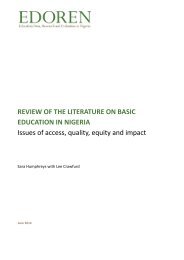review-of-the-literature-on-basic-education-in-nigeria-june-2014-3-1
review-of-the-literature-on-basic-education-in-nigeria-june-2014-3-1
review-of-the-literature-on-basic-education-in-nigeria-june-2014-3-1
You also want an ePaper? Increase the reach of your titles
YUMPU automatically turns print PDFs into web optimized ePapers that Google loves.
Review <str<strong>on</strong>g>of</str<strong>on</strong>g> <str<strong>on</strong>g>the</str<strong>on</strong>g> <str<strong>on</strong>g>literature</str<strong>on</strong>g> <strong>on</strong> <strong>basic</strong> educati<strong>on</strong> <strong>in</strong> NigeriaThat said, ma<strong>in</strong>tenance is clearly an issue (Copp<strong>in</strong>ger 2009; Takahashi 2010). Water sources aresometimes damaged, especially when shared by communities, with delays before <str<strong>on</strong>g>the</str<strong>on</strong>g>y are repaired;equally, wells or water tanks can be dry (Copp<strong>in</strong>ger 2009; UNICEF 2012). The external evaluati<strong>on</strong> <str<strong>on</strong>g>of</str<strong>on</strong>g>JICA’s primary school c<strong>on</strong>structi<strong>on</strong> project (Takahashi 2010; see also Box 6.1) emphasised <str<strong>on</strong>g>the</str<strong>on</strong>g>importance <str<strong>on</strong>g>of</str<strong>on</strong>g> ma<strong>in</strong>tenance tra<strong>in</strong><strong>in</strong>g and understand<strong>in</strong>g <str<strong>on</strong>g>of</str<strong>on</strong>g> shared resp<strong>on</strong>sibilities. Thus, <strong>in</strong> Kaduna,where <str<strong>on</strong>g>the</str<strong>on</strong>g> head teachers who had been tra<strong>in</strong>ed were still <strong>in</strong> post and where <str<strong>on</strong>g>the</str<strong>on</strong>g>re was an understand<strong>in</strong>gthat schools and <str<strong>on</strong>g>the</str<strong>on</strong>g> PTA would do small-scale repairs and SUBEB would take over <str<strong>on</strong>g>the</str<strong>on</strong>g> rest, <str<strong>on</strong>g>the</str<strong>on</strong>g> schoolfacilities were still <strong>in</strong> good order when visited. On <str<strong>on</strong>g>the</str<strong>on</strong>g> o<str<strong>on</strong>g>the</str<strong>on</strong>g>r hand, <strong>in</strong> Plateau and Niger states, where<str<strong>on</strong>g>the</str<strong>on</strong>g>re had been changes <strong>in</strong> pers<strong>on</strong>nel and lack <str<strong>on</strong>g>of</str<strong>on</strong>g> clarity as to ma<strong>in</strong>tenance roles and resp<strong>on</strong>sibilities,some schools were already beg<strong>in</strong>n<strong>in</strong>g to show signs <str<strong>on</strong>g>of</str<strong>on</strong>g> wear.Importantly, <str<strong>on</strong>g>the</str<strong>on</strong>g> basel<strong>in</strong>e for <str<strong>on</strong>g>the</str<strong>on</strong>g> USAID-funded COMPASS project <strong>in</strong> Bauchi, Kano, Lagos, Nasarawa and<str<strong>on</strong>g>the</str<strong>on</strong>g> FCT found that, even where schools had safe water, pupils did not necessarily have free access(Keat<strong>in</strong>g 2005).Moreover, provisi<strong>on</strong> <str<strong>on</strong>g>of</str<strong>on</strong>g> toilet facilities is <strong>in</strong> itself <strong>in</strong>sufficient to address <str<strong>on</strong>g>the</str<strong>on</strong>g> issue <str<strong>on</strong>g>of</str<strong>on</strong>g> <strong>in</strong>adequatesanitati<strong>on</strong> provisi<strong>on</strong>. For example, <strong>on</strong>ly 32% <str<strong>on</strong>g>of</str<strong>on</strong>g> pupils <strong>in</strong> <str<strong>on</strong>g>the</str<strong>on</strong>g> GEP II evaluati<strong>on</strong> said <str<strong>on</strong>g>the</str<strong>on</strong>g>y actually used <str<strong>on</strong>g>the</str<strong>on</strong>g>school toilets (UNICEF 2012). This could be due to a number <str<strong>on</strong>g>of</str<strong>on</strong>g> reas<strong>on</strong>s, <strong>in</strong>clud<strong>in</strong>g safety, cleanl<strong>in</strong>ess andcultural sanitati<strong>on</strong> practices. As <str<strong>on</strong>g>the</str<strong>on</strong>g> UNICEF and o<str<strong>on</strong>g>the</str<strong>on</strong>g>r studies have noted, toilets may have doorshang<strong>in</strong>g <str<strong>on</strong>g>of</str<strong>on</strong>g>f, <str<strong>on</strong>g>the</str<strong>on</strong>g>refore not giv<strong>in</strong>g privacy, or can be filthy and vandalised, <str<strong>on</strong>g>the</str<strong>on</strong>g>refore unhealthy and not <strong>in</strong>use, or dark and poorly ventilated (Boult<strong>on</strong> et al. 2009; UNICEF 2009a; UNICEF 2012; Dunne et al. 2013).This is <str<strong>on</strong>g>of</str<strong>on</strong>g>ten <str<strong>on</strong>g>the</str<strong>on</strong>g> case where schools lack <str<strong>on</strong>g>the</str<strong>on</strong>g> appropriate security and/or a secure compound fence toprotect <str<strong>on</strong>g>the</str<strong>on</strong>g> facilities from outsiders (Boult<strong>on</strong> et al. 2009; Co<strong>in</strong>co 2012; Dunne et al. 2013). The str<strong>on</strong>godour <strong>in</strong> extreme heat has also been identified as a factor prevent<strong>in</strong>g use (Evans et al. 2009), whilestudies <str<strong>on</strong>g>of</str<strong>on</strong>g> gender violence elsewhere <strong>in</strong> Africa (e.g. Leach et al. 2003 <strong>in</strong> Ghana, Malawi and Zimbabwe)have highlighted how toilets are <str<strong>on</strong>g>of</str<strong>on</strong>g>ten danger spots where girls are particularly pr<strong>on</strong>e to harassment and<str<strong>on</strong>g>the</str<strong>on</strong>g>refore avoid <str<strong>on</strong>g>the</str<strong>on</strong>g>m.Cultural issues may also c<strong>on</strong>tribute to lack <str<strong>on</strong>g>of</str<strong>on</strong>g> toilet use. A study <str<strong>on</strong>g>of</str<strong>on</strong>g> communities <strong>in</strong> Jigawa and Benue hasechoed f<strong>in</strong>d<strong>in</strong>gs <strong>in</strong> o<str<strong>on</strong>g>the</str<strong>on</strong>g>r studies <strong>in</strong> West Africa <strong>in</strong> show<strong>in</strong>g that without address<strong>in</strong>g <str<strong>on</strong>g>the</str<strong>on</strong>g> various cultures<str<strong>on</strong>g>of</str<strong>on</strong>g> sanitati<strong>on</strong> practices and <strong>in</strong>volv<strong>in</strong>g community members <strong>in</strong> <str<strong>on</strong>g>the</str<strong>on</strong>g> process <str<strong>on</strong>g>of</str<strong>on</strong>g> design, locati<strong>on</strong> andalignment <str<strong>on</strong>g>of</str<strong>on</strong>g> toilets/latr<strong>in</strong>es, people may not use <str<strong>on</strong>g>the</str<strong>on</strong>g> facilities (Dittmer 2009; Evans et al. 2009).3.3.1 ElectricityAccess to electricity is a problem countrywide, particularly <strong>in</strong> nor<str<strong>on</strong>g>the</str<strong>on</strong>g>rn regi<strong>on</strong>s, rural areas and am<strong>on</strong>g<str<strong>on</strong>g>the</str<strong>on</strong>g> urban poor, as Table 3.4 <strong>in</strong>dicates (UNDP 2009). The nati<strong>on</strong>al educati<strong>on</strong>al survey menti<strong>on</strong>ed abovefound 65% <str<strong>on</strong>g>of</str<strong>on</strong>g> schools to be without electricity (Ikoya and Onoyase 2008), although even whereelectricity is <str<strong>on</strong>g>the</str<strong>on</strong>g>oretically available <str<strong>on</strong>g>the</str<strong>on</strong>g> supply is <str<strong>on</strong>g>of</str<strong>on</strong>g>ten erratic. A World Bank report noted that <str<strong>on</strong>g>the</str<strong>on</strong>g>re arepower outages 320 days a year, accord<strong>in</strong>g to enterprise surveys, which is worse than anywhere else <strong>in</strong>Africa (Foster and Pushak 2011).In schools without electricity and with dark classrooms, it has been found to be too dark to see <str<strong>on</strong>g>the</str<strong>on</strong>g>chalkboard when <str<strong>on</strong>g>the</str<strong>on</strong>g> sky is overcast <strong>in</strong> <str<strong>on</strong>g>the</str<strong>on</strong>g> ra<strong>in</strong>y seas<strong>on</strong> or dur<strong>in</strong>g <str<strong>on</strong>g>the</str<strong>on</strong>g> Harmattan, which has a negativeimpact <strong>on</strong> educati<strong>on</strong>al quality (Dunne et al. 2013). Where <str<strong>on</strong>g>the</str<strong>on</strong>g>re is electricity, it may be restricted to <str<strong>on</strong>g>the</str<strong>on</strong>g>IT suite and head teacher’s <str<strong>on</strong>g>of</str<strong>on</strong>g>fice (Boult<strong>on</strong> et al. 2009).Given <str<strong>on</strong>g>the</str<strong>on</strong>g> issues surround<strong>in</strong>g <str<strong>on</strong>g>the</str<strong>on</strong>g> supply <str<strong>on</strong>g>of</str<strong>on</strong>g> electricity and <str<strong>on</strong>g>the</str<strong>on</strong>g> c<strong>on</strong>comitant problems withtelecommunicati<strong>on</strong>s <strong>in</strong> Nigeria (Foster and Pushak 2011), it will be a l<strong>on</strong>g time before <str<strong>on</strong>g>the</str<strong>on</strong>g> government’sstated desire (as articulated <strong>in</strong> <str<strong>on</strong>g>the</str<strong>on</strong>g> Nati<strong>on</strong>al Educati<strong>on</strong> Policy (FME 2004a)) to <strong>in</strong>tegrate ICT <strong>in</strong>to <str<strong>on</strong>g>the</str<strong>on</strong>g>curriculum is realised (Agyeman 2007). Unreliable and sparse electricity will also impede <strong>in</strong>itiatives us<strong>in</strong>gmobile ph<strong>on</strong>es for educati<strong>on</strong> purposes – as is be<strong>in</strong>g proposed for nomadic educati<strong>on</strong>, for example(Ader<strong>in</strong>oye 2007) – as it will be difficult to charge <str<strong>on</strong>g>the</str<strong>on</strong>g>m.EDOREN – Educati<strong>on</strong> Data, Research and Evaluati<strong>on</strong> <strong>in</strong> Nigeria 29



